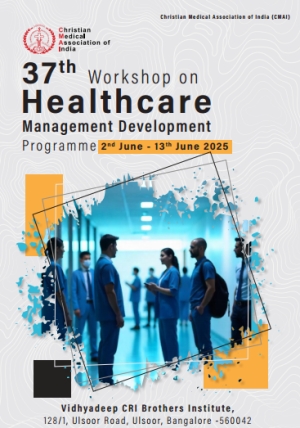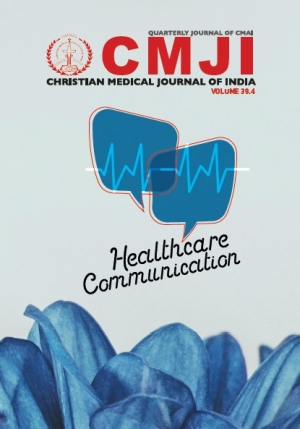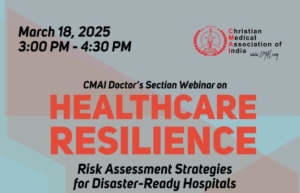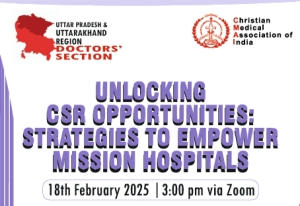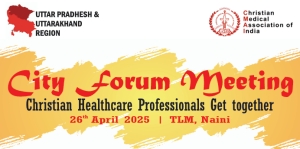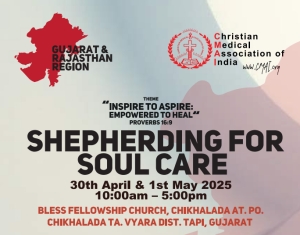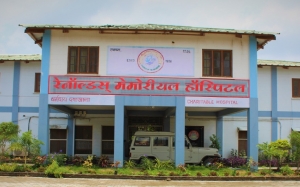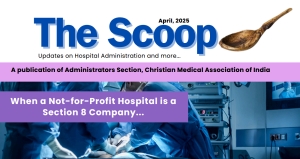News from Network
Site Manager
Friday, 23 May 2025 15:33
Diploma in Hospital Administration (DHA)
A one-year distance learning programme integrating theory and practice for healthcare professionals in mission hospitals in rural and semi urban areas.
The staff of small hospitals face big challenges from rising patient expectations, expanding regulatory requirements and the rapid pace of change in healthcare. On-the-job training and experience may not be sufficient for them to meet these challenges.
The Christian Medical College Vellore (CMC) has joined hands with the Christian Medical Association of India (CMAI) to introduce a blended learning programme designed for employees of mission hospitals: Diploma in Hospital Administration.The course will help them acquire the knowledge and skills needed to become efficient managers and leaders while continuing to serve their institutions. It will help them to integrate theoretical and scientific frameworks with their own experience to implement best practices in their hospitals. Moreover, it will help them to develop the confidence and ability to deal with a range of management issues.
Published in Conferences
Tagged under
Tuesday, 13 May 2025 10:01
Management Development Management Workshop 2025
Published in Conferences
Tagged under
Wednesday, 23 April 2025 14:02
HEALTHCARE RESILIENCE WEBINAR
Published in Webinars
Tagged under
Wednesday, 23 April 2025 13:56
Communitisation in Mission Hospitals - Dr Johnny Oommen
Published in Webinars
Tagged under
Wednesday, 23 April 2025 13:32
Unlocking CSR Opportunities
Published in Webinars
Tagged under
Tuesday, 15 April 2025 10:14
City Forum Meeting - UP & UK Region
Published in Conferences
Tagged under
Tuesday, 15 April 2025 10:07
Shepherding for Soul Care
Published in Upcoming Events
Tagged under
Thursday, 10 April 2025 10:09
CMC Vellore calling for Multiple Positions at Reynolds Memorial Hospital & Affiliated Clinics, Washim, Maharashtra
CMC is involved in developing the services within the hospital and the community and in training healthcare workers to respond to the invites applications from those interested as we look for more helping hands to join us in rebuilding the services. Wanted Doctors & Nurses for REYNOLDS MEMORIAL HOSPITAL, Washim, Maharashtra (Hospital under a tripartite management between CMC Vellore, EHA and the Church of the Nazarene.)
Need for:
- Medicine -MD/DNB
- Family medicine-MD/DNB
- Community Medicine-MD
- Obstetrics & Gynaecology- MS
- Surgery – MS
- Paediatrics – MD/DCH
- Medical Oncology - DM
- Medical Officer - MBBS
- BSc Nursing – Tutor
- MSc Nursing – Psychiatry, Community
- Allied Health – BSc Radiodiagnosis
- Administrator – MHA, MBA (Medical background preferred but not mandatory)
100 Bedded hospital with good infrastructure to develop services
Location of Job: Reynolds Memorial Hospital, Washim, Maharashtra
Semi furnished accommodation within the Hospital campus
CONTACT INFO:
Missions Office, Directorate, CMC Vellore
Email: This email address is being protected from spambots. You need JavaScript enabled to view it.
Call: 0416 228 6117/6229
(WhatsApp Number) – 892539611
Published in Network Vacancies
Tagged under
Monday, 07 April 2025 09:24
The Scoop - April 2025
Published in Administrators' Section e-Magazine
Tagged under
Head Quarters
CMAI
A-3, Local Shopping Centre, Janakpuri,
New Delhi - 110058, India
011-41003490 / 41064328
+91-11-255 98 150
cmai@cmai.org
Bangalore Office
HVS Court, 3rd Floor
21 Cunningham Road
Bangalore – 560052,
Karnataka
080 22205464, 22205837, 22257844
080 22205826
cmaiblr@cmai.org
Registered Office
CMAI
Christian Council Campus
NCCI Road, Civil Lines
Nagpur – 440001
Maharashtra


